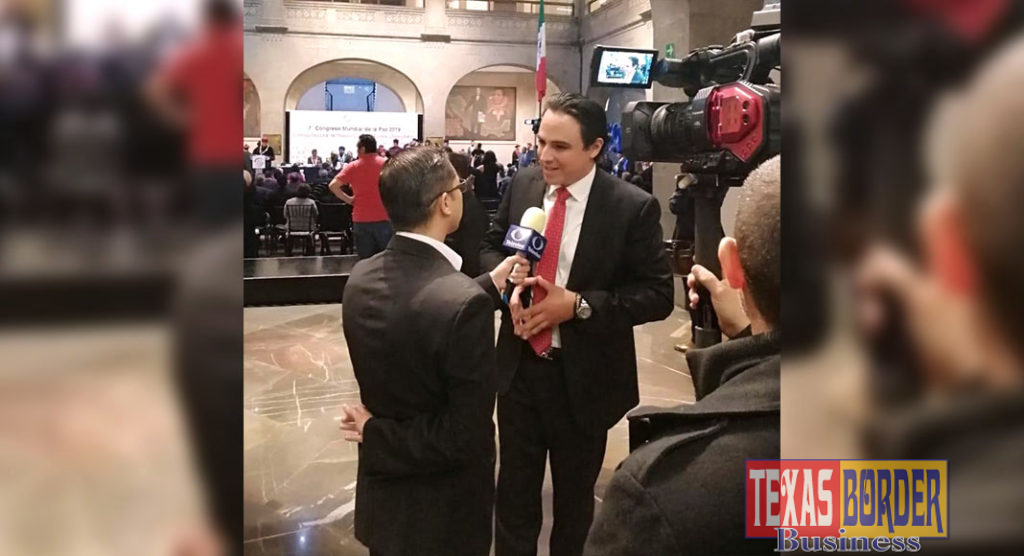
Texas Border Business
By David A. Díaz
As of Wednesday, June 26, 2019, Rep. Terry Canales, D-Edinburg joined the ranks of dedicated leaders worldwide, as being a recipient of an Honorary Doctorate with a Cause, bestowed by Claustro Mundial Universitario (World University Committee), for the South Texas lawmaker’s public service on behalf of international and immigrant rights.
Canales and other designees received the Honorary Doctorate with a Cause from Claustro Mundial Universitario during their 7th World Peace Conference in a solemn ceremony which took place inside the historic headquarters of the Senate of the Republic in Mexico City.
The Honorary Doctorate with a Cause is a prestigious tribute granted to prominent individuals who fulfill their duties with respect and honor, and in the case of Canales, it was “delivered in recognition of his outstanding career, humanitarian contributions and his spirit of help,” according to the proclamation from Claustro Mundial Universitario.
In addition to the stated above, Canales, who also serves as Chair, House Committee on Transportation, earned the prestigious recognition for his public stances and actions on behalf of young immigrant children and their young mothers currently in temporary custody of the U.S. Border Patrol facilities.
Canales said he is humbled and honored to receive the Honorary Doctorate with a Cause distinction because,throughout his tenure in the Texas Legislature, he has worked very hard on behalf of his House District 40 constituents and has never forgotten people in most need.
Canales’ selection for the Honorary Doctorate with a Cause was based on the highest standards established by the leaders of Claustro Mundial Universitario, which has a global reach with representation in 182 nations and five continents.
As he received his recognition, Canales said that regardless of Texans’ and Americans’ political views regarding immigrant children and their young mothers coming to the U.S., he reminded everyone of the famous phrase: “The true measure of any society can be found in how it treats its most vulnerable members.”
Specifically, Canales supported legislation to let family violence victims know more accurately the whereabouts of convicted abusers when those criminals are out on bond for their violence, to develop classroom education to teach young people how to be in a healthy relationship, and to increase state funding for women’s shelters across the state.
In 2013, also of importance to anyone who has difficulty speaking, reading, or writing in English, Canales, who is an attorney, successfully guided his House Bill 2090 through the House Committee on Criminal Jurisprudence and the Texas Legislature to require a written statement of an accused that is signed by the accused or bearing the mark of the accused to be made in a language the accused can read or understand in order for such statement to be admissible as evidence against the accused in a criminal proceeding.
“HB 2090, which was signed into law in June 2013 by Gov. (Greg) Abbott, establishes a sensible procedure to ensure the integrity of the judicial system by requiring that the accused be able toread and understand the written statement the person sign,” Canales said. “Before, it was possible that a non-English speaker could sign a written statement in English without understanding the content of the statement.”
This could put important evidence in doubt or could be used wrongfully as evidence in a case, he emphasized.
“In some instances, in Texas, a statement signed by an accused person who did not understand the statement has been used against the accused in trial,” Canales said. “This inaccuracy can undermine the criminal justice system. HB 2090 promotes fundamental fairness by simply requiring that the accused be able to read and understand their statements.”

Sen. Juan “Chuy” Hinojosa, D-McAllen, carried Canales’ HB 2090 in the Texas Senate.














